 Petzlover
Petzlover Devon Rex is originated from United Kingdom but Tuxedo is originated from United States. Both Devon Rex and Tuxedo are having almost same weight. Devon Rex may live 7 years less than Tuxedo. Both Devon Rex and Tuxedo has same litter size. Devon Rex requires Low Maintenance. But Tuxedo requires Moderate Maintenance
Devon Rex is originated from United Kingdom but Tuxedo is originated from United States. Both Devon Rex and Tuxedo are having almost same weight. Devon Rex may live 7 years less than Tuxedo. Both Devon Rex and Tuxedo has same litter size. Devon Rex requires Low Maintenance. But Tuxedo requires Moderate Maintenance
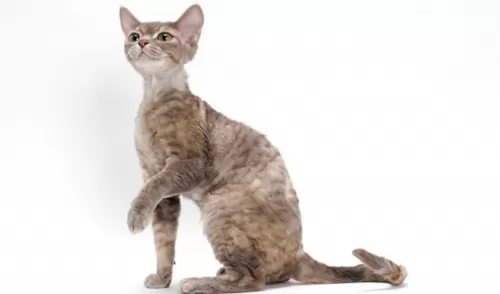 The Devon Rex is a cat known for its large ears and its curly, soft coat. It hails from England, emerging in the 1950s.
The Devon Rex is a cat known for its large ears and its curly, soft coat. It hails from England, emerging in the 1950s.
The cat is recognized by quite a few cat associations. The first of these cats was discovered by Beryl Cox in 1959 in Buckfastleigh, Devon. When the cat started appearing in cat shows in the UK, people starting becoming interested in owning these unusual cats.
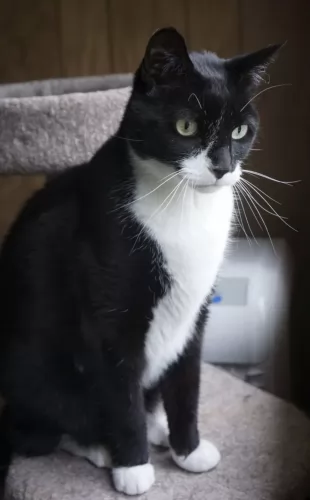 The Tuxedo cat is essentially a black and white cat and the name comes from him looking like he is dressed in a formal tuxedo.
The Tuxedo cat is essentially a black and white cat and the name comes from him looking like he is dressed in a formal tuxedo.
Tuxedos aren’t a new cat breed and they have been around for thousands of years. Tuxedo is merely describing the coat of the cat. So the Tuxedo cat isn’t a cat breed but rather a pattern color. A Persian cat as an example, can be a tuxedo cat because of its coat.
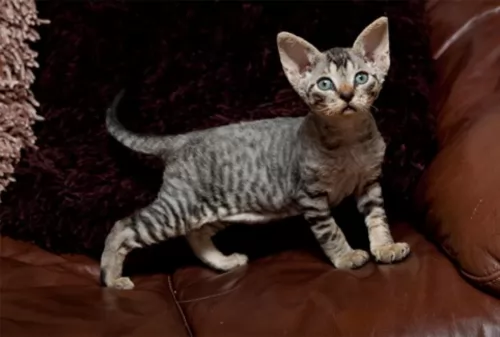 Known for its slender, light build, and weighing roughly between 2 and 4kg, the medium-sized Devon Rex has large, rounded ears. It is the large, rounded ears, set low on the sides of the broad head that make it slightly gremlin-like in appearance.
Known for its slender, light build, and weighing roughly between 2 and 4kg, the medium-sized Devon Rex has large, rounded ears. It is the large, rounded ears, set low on the sides of the broad head that make it slightly gremlin-like in appearance.
Their eyes are also large, and their noses are slightly upturned. It’s short, curly coat is another unusual feature and comes in many colors and patterns. The eyes can be blue, yellow, copper or he can be odd-eyed.
Your Devon Rex is quite a naughty cat, enjoying getting up to all kinds of mischief. Energetic, they love leaping up high onto perches so you’ll often find your Devon Rex in odd spots, more so if it's a spot in the sun as he loves warmth. It is why it is important to buy a cat tree for this cat.
It’s a loving, loyal cat and it will attach itself to one member of the family and then they are capable of pouring out the love and affection on this particular person. They’re also playful cats, as well as being intelligent.
He can learn a few tricks and can also be trained to walk on a leash. This is an active, energetic breed and will provide his human family with hours of amusing entertainment.
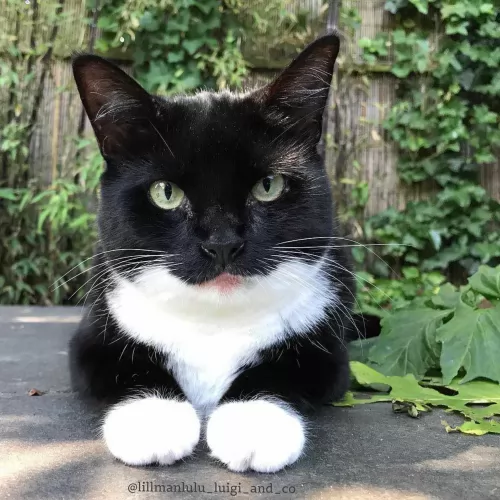 A tuxedo cat has distinct coat colors. Their bicolor coats are soft and sleek and sometimes the colors aren't limited to just black and white but they can be orange, gray or tortoiseshell.
A tuxedo cat has distinct coat colors. Their bicolor coats are soft and sleek and sometimes the colors aren't limited to just black and white but they can be orange, gray or tortoiseshell.
Because Tuxedo cats aren’t a breed, nothing is really set in stone with them and their size ranges. This means he can weigh between 3 and 7kg or 8 or even 9kg. The eyes of the Tuxedo cat are nearly always green.
The Tuxedo cat’s personality is varied as well because it can be any breed of cat. There are some Tuxedo cat owners who will say that their cats have a definite Tuxedo personality, but there is no research that indicates that these cats have a particular personality.
They are all different. Most Tuxedo cats however are friendly, social, loving, and lively.
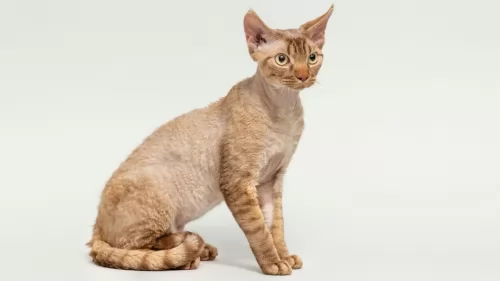 Your Devon Rex is a social cat and is happy to be found on your lap. He doesn’t take kindly to being left on his own though. He isn’t a suitable fit for someone who works all day.
Your Devon Rex is a social cat and is happy to be found on your lap. He doesn’t take kindly to being left on his own though. He isn’t a suitable fit for someone who works all day.
If you love animals, then maybe another companion animal would be a good idea as he is an amicable cat and gets on well with other animals.
When you spend time with your cat, make sure it is a special time, full of treats and stimulating play as he will learn to even fetch a small ball.
Just give him lots of attention and he’ll be your provider of companionship and entertainment.
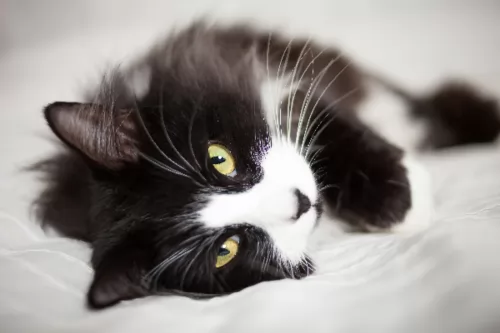 The tuxedo cat is such a sport - always up for fun and games. Cats like the tuxedo are always a great choice of pet.
The tuxedo cat is such a sport - always up for fun and games. Cats like the tuxedo are always a great choice of pet.
Cats like the tuxedo are also low maintenance and he is clever enough to even have a bit of training.
The tuxedo cat, even though he likes the outdoors, can also be an apartment cat. He also gets on well with children and other pets in the home. Having a tuxedo in the home is guaranteed to fill your home with joy, and you owe it to him to provide him with lots of love and attention.
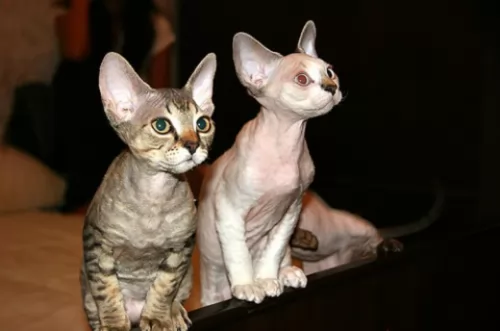 This particular cat isn’t known for any extreme health issues but even so, there are some health problems that are important to know about -
This particular cat isn’t known for any extreme health issues but even so, there are some health problems that are important to know about -
This is where the patella or knee cap moves out of its usual spot. It can occur because of a number of reasons such as an injury or congenital malformation. The vet will want x-rays because sometimes hip dysplasia is also present.
This is an inherited condition seen in both male and female cats and usually in young kittens. The cat has an odd gait with a head that bobs along as is tries to walk. The cat has tremors and also has difficulty with swallowing. With a visit to the vet and special care, your cat can do well.
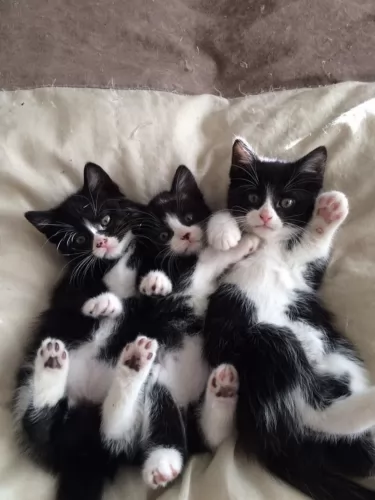 The Tuxedo cat has no real health concerns and that is just another reason why they make such popular pets. There are, however, always health issues that a cat can succumb to.
The Tuxedo cat has no real health concerns and that is just another reason why they make such popular pets. There are, however, always health issues that a cat can succumb to.
This is caused by kidney disease. It is one of the leading causes of death in older cats, and causes can include age but also genetics.
Your cat can show a number of symptoms such as excessive urination, nausea, terrible thirst, dehydration, constipation, and loss of appetite.
There is no cure for feline kidney disease but it can be treated and managed, and that is why you will need to see the vet.
This is the dreaded feline distemper for which your cat will need to be vaccinated against. It is a highly contagious viral disease, with kittens being more at risk.
After contracting the disease. It can spread through bodily fluids as well as fleas and is mostly transmitted by contaminated food and water bowls as well as litter trays.
The disease affects the intestinal tract of the cat and attacks the immune systems. Your cat will be vomiting, have diarrhea and anemia and he will have loss of appetite, lethargy and be totally and utterly down in the dumps.
Cancer is common in cats of all ages. When you brush your Tuxedo, be aware of any unusual lumps. Lymphoma is a common cancer in cats.
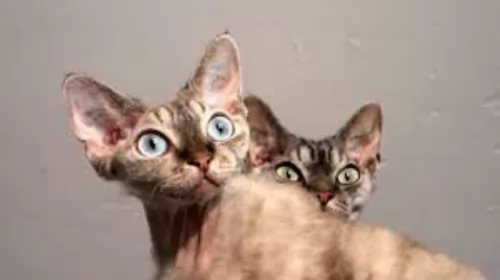 The Devon rex cat breed is known for its unusual looks with its wavy fur, large ears and large eyes. It is considered a rare breed and you want to make sure that you take proper care of him.
The Devon rex cat breed is known for its unusual looks with its wavy fur, large ears and large eyes. It is considered a rare breed and you want to make sure that you take proper care of him.
Owners of the Devon Rex know that these cats love their food and it has to be top quality food to enhance good feline health.
Cats are carnivores, ad this actually means that they should stick to a meat diet. Any food you buy your cat should be mainly meat. Look at the packaging of the commercially manufactured cat foods you want to buy, and make sure that the first few ingredients are some sort of meat.
Remember that any uncertainty with feeding your cat, you can chat with your vet.
Keep the inside of your cat’s ear free of an accumulation of wax and dirt as well as infection. If you don’t like the idea of probing in your cat’s ears, be in contact with your vet or a reputable, professional cat groomer.
Trim the cat’s nails.
Check inside his mouth for bad teeth as this could be causing him pain.
Clean your cat’s litter box every single day and also replace the grit regularly.
Get your cat veterinary care as soon as he shows signs of illness. Certainly, make sure all his vaccines and deworming are up to date.
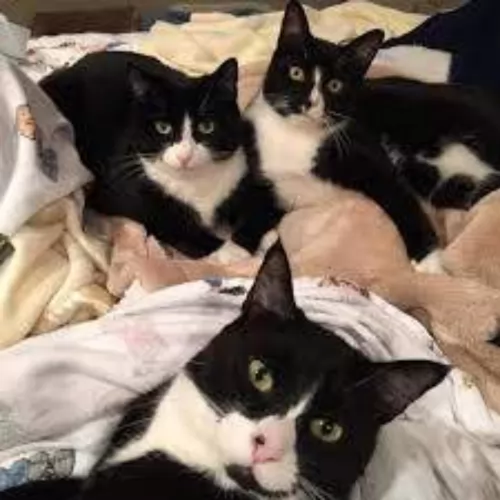 The Tuxedo cat is cared for in much the same way that you would care for any other cat really.
The Tuxedo cat is cared for in much the same way that you would care for any other cat really.
The coat of the Tuxedo requires no special treatment as the coat isn’t really ever long. Simply brush it at least once a week to reduce matting and dust collecting on the coat. You want to keep it shiny and sleek.
Provide a scratching post and a climbing tree as these are both taking care of natural instincts of a cat – to scratch and to leap.
Ensure your pet isn’t bored. Provide him with plenty of opportunities to have fun and to play. Provide him with interactive toys to keep him amused.
Cats like to sleep quite a bit so provide him with a nice soft bed in a quiet area.
If your Tuxedo is an indoor cat, he will need a litter box in a quiet area. Be sure to clean the litter box of feces every single day. Make sure that the actual litter is kept clean and tidy.
Your Tuxedo cat should be fed the same diet as any other cat. This is because every cat there is is a carnivore and their diet has to be made up of meat. A wet food diet or a dry food diet is available but make sure it is always of the highest quality. This will ensure your pet gets all the nutrients to ensure good health. Discuss your cat's s dietary needs with your vet if you are in any doubt.